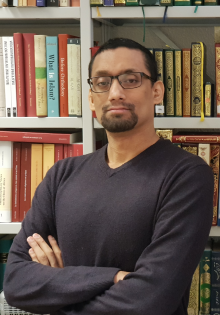NRW provides around 2 million euros of funding to a joint project examining the social transfer of comparative theology
The Centre for Comparative Theology and Cultural Studies (ZeKK) at Paderborn University and the International Center for Comparative Theology and Social Issues (CTSI) at the University of Bonn are further developing their existing collaborations in the field of comparative theology. The Ministry of Culture and Science of the state of North Rhine-Westphalia is providing just under two million euros of funding to a joint project seeking to establish a collaborative platform for social transfer. Ina Brandes, the Minister of Culture and Science of the state of North Rhine-Westphalia, presented the funding decision to the project managers on Wednesday 26 April.
Minister Brandes: ‘With our funding programme, we are creating scope for researchers to devote their attentions to future-oriented topics and promote innovative ideas. In doing so, we are making North Rhine-Westphalia even more attractive and productive as a hub of top-level research. The networking between the Centre for Comparative Theology and Cultural Studies and the International Center for Comparative Theology and Social Issues will help to reduce the potential for conflict between religions, and thus make an invaluable contribution to social coherence.’
Comparative theology is a relatively recent academic discipline that seeks to change religions from within by drawing inspiration from other religions for a deeper reflection on their own theology. Comparative theology is dialogue-based and cooperative in nature, meaning that the theologies of different religions are intermeshed to enable them to develop joint approaches to solving social problems, reduce the potential for violence within religions, and support their productive interrelationship. Head of ZeKK and Professor of Quranic Exegesis Zishan Ghaffar explains: ‘Only Paderborn is developing Islamic theology that is being consistently comparatively applied to all disciplines. It has a diverse network within the university and city and is gaining increasing reach. For us, this state funding represents an accolade and an incentive to further integrate this unique orientation within society.’
Formats for interreligious encounters are to be jointly developed at various comparative theology learning sites in NRW, together with comparative theology teaching and learning materials for young and old, to address the needs of religious communities between themselves as well as of state and municipal educational institutions. Across three work content packages covering digital communications, event management and educational work, researchers are developing cross-location concepts drawing on Christian, Jewish and Islamic perspectives.
Head of CTSI and Professor of Systematic Theology Klaus von Stosch is delighted: ‘Our top-level international research will now also be able to finally leave its mark on society. Given the many crises of our times, this allows us to show that religions do not simply cause social problems, but can also be the key to solving them.’ Von Stosch was appointed the newly created ‘Schlegel Professor’ of Catholic Theology at the University of Born in 2021 as part of the excellence strategy. He is a member of the ‘Individuals & Societies’ and ‘Present Pasts’ transdisciplinary research areas.
The universities will be working closely together with Berlin foundation House of One as an unfunded partner, providing scientific momentum for their work. House of One is an interreligious construction and dialogue project in Berlin that combines a mosque, synagogue and church under one roof as a unique, shared place of prayer and teaching, and has been drawing inspiration from comparative theology research right from the outset.
As part of the ‘2022 cooperation platforms’ funding announcement, the Ministry of Culture and Science of the state of North Rhine-Westphalia is supporting the development of shared platforms for applied research with non-academic partners in and for North Rhine-Westphalia. The project begins in May and is scheduled to run until April 2027. For Roland Stolte, the man behind the concept of Berlin’s House of One, this is a very special configuration: ‘The funding period matches the time when the House of One is being built in Berlin, and we can expect to gain even greater attention both at home and abroad. Given pressing future issues, we absolutely must make the most of this attention and explore new means of exchange between religions and society with the greatest interreligious and theological care. We are therefore very much looking forward to this collaboration.



